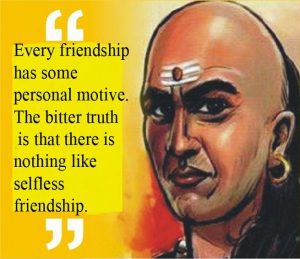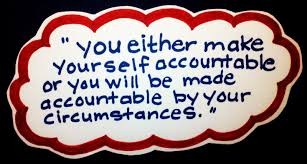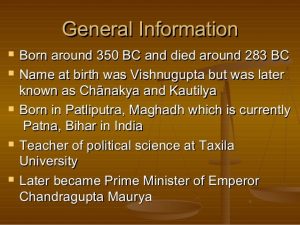The modern day leaders are compared to kings and queens who do not reside in palaces but are found in corporate boardrooms. Chanakya who was also called Kautilya has mentioned thousands of years ago that the first responsibility of a leader is to identify reality. If one needs to make improvement in situation, he/she must first accept the truth, the way things are working at the moment. The moment the leader becomes judgemental he/she tends to make it wrong. Judgements only distort the truth. What Chanakya said, still holds true in this present day and age. He also talks about glory of friendship: every friendship has some motive. Therefore, understanding why somebody is your friend solves many emotional problems.
Arthashastra, the treatise on Economic Administration was written by Chanakya in the 4th century BC. It consists of 15 chapters, 380 Shlokas and 4968 Sutras. In all pr obability, this treatise is the first ever book written on Practice of Management. It is basically on the art of governance in an instructional tone. Arthashastra is about how to reign, how not to misuse power. In fact, several concepts described in Arthashastra, vividly talk about present day management theories; for example, the importance of vision, mission and motivation is very well captured in Arthashastra. It covers the organizational aspects, human dimensions of an organization as well as the leadership styles and their outcomes in an organization.
obability, this treatise is the first ever book written on Practice of Management. It is basically on the art of governance in an instructional tone. Arthashastra is about how to reign, how not to misuse power. In fact, several concepts described in Arthashastra, vividly talk about present day management theories; for example, the importance of vision, mission and motivation is very well captured in Arthashastra. It covers the organizational aspects, human dimensions of an organization as well as the leadership styles and their outcomes in an organization.
The world is facing paucity for leadership: many people have defined and conceptualised leadership. We have indistinct ideas about leadership. The subject is taught at universities and schools by, most of the times by non-leaders. True leaders are sought after. Leadership is not an easy subject to explain. In 4th century, Chanakya’s opinions were ahead of times which have proved to be beneficial if adopted by people even today. He was a man of wisdom; he had an opinion on various things in the world. Chanakya was a philosopher, an economist, jurist and royal advisor to Chandragupta Maurya. He is in fact the pioneer of the field of economics and political science in India, and his work is thought of as an important invention in classical economics. His works were lost near the end of the Gupta Empire and not rediscovered until the early twentieth century.
Here are some of his views on leadership: a good leader does not stop until the task at his hands is finished. He rests only after he finishes his work. He is not afraid of failure. Chanakya said people who work sincerely are the happiest. Most people fail because they just do not carry on.
Effective communication: Chankya quotes- “When in the court, he shall never cause his petitioners to wait at the door, for when a king makes himself inaccessible to his people and entrusts his work to his immediate officers, he may be sure to engender confusion in business, and to cause thereby public disaffection, and himself a prey to his enemies.” A leader listens to his subordinate. He makes himself accessible to people, solves their problems. Clarity in instructions is crux of effective communication.
Decision Making: Effective leadership is about not postponing decisions; when problems are not solved in time, they become hard or sometimes impossible to accomplish. Nations and organizations face most problems because of delayed decision making.
There are several reasons why decision making is slow in most organizations: lack of empowerment down the line is one reason why all decisions seem to get passed up the hierarchy which results in a bottleneck. Processes are at times followed more in letter than spirit. Decision making is centralized or rather in the custody of key personnel in the organization and these people are always busy.
Happiness: Chanakya quotes “In the happiness of his subjects lies his happiness; in their welfare his welfare; whatever pleases himself he shall not consider as good, but whatever pleases his subjects he shall consider as good”. According to Chanakya, a good leader gives priorities first to his peers and subordinates, his priorities and activities come secondary to the real needs and issues of the organization. When organizations look after their employees and keep them happy, the employees serve customers properly, thus having happy customers.
Accountability: according to Chanakya, holding people accountable for their results is one of the most important roles of a leader. And, a good leader himself accepts responsibility of his actions and deeds. What we see often is that those who perform well are burdened with more and more responsibility and by contrast those whose performance is not up to the mark seem to get away with minimal work. Chanakya said a leader must reward the high performers and give due punishment to the under performers. The measure of leadership is not the quality of the head, but actions. Leaders owe a certain maturity. Maturity as expressed in a sense of self-worth, a sense of belonging, sense of expectancy, a sense of responsibility, a sense of accountability, and a sense of equality.
Maintain secrecy: The biggest advice given by Chanakya is never sharing your secrets with anybody. Your secrets will destroy you, and if you cannot keep a secret- you cannot expect others to keep it. We see people at top gossiping, bitching behind backs of others. People change loyalties very fast to gain acceptability. A loyal and strict leader follows ethics. Even when you trust someone very much, exercising caution is always advisable.
When we talk about management practices, we talk about only Western countries and give them credit for the concepts; we are familiar with the success stories of their big corporations. We nod our heads in acceptance when we hear what they teach at Ivy League business schools. We have been conditioned to believe that what they teach in these western management schools and the successes of western enterprises is what we should emulate.
But sadly, we have forgotten Chanakya who was the originator of management concepts. The manifestation of Chankya’s vision was Emperor Chandragupta Maurya, the first person to rule over an empire which stretched across India and into parts of Afghanistan and Persia (Iran). But Chandragupta could do that due to the vision and tutelage of Chanakya who was his teacher and mentor. I salute this great master!!!!















































